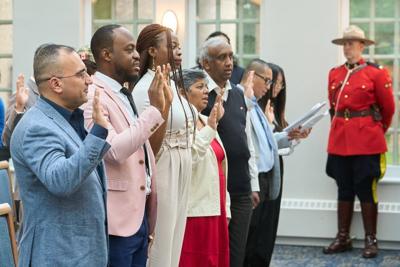Contrary to public impression, Canadian citizenship turns out to be more a sign of an immigrant’s commitment to the country than a convenience to leave for greener pastures.
In fact, according to a new Statistics Canada report, immigrants from developed countries and those who took longer to become citizens were the ones more likely to leave the country after getting their citizenship.
“Among naturalized immigrants, active presence typically exceeded 90 per cent in the 10th year after immigration,” said . “It showed minimal variation across educational levels, official language profiles, age at immigration and immigration classes.”
The findings debunk the myth that immigrants are “Canadians of convenience,” who take advantage of citizenship for the privilege of a Canadian passport but have no intention to stay and keep ties with their adopted homeland.
“It demolishes largely the argument that people just get citizenship so they have mobility and they can leave the country to pursue opportunities,” said Andrew Griffith, an expert on Canadian citizenship.
“There aren’t as many citizens of convenience as people might think. That actually is a measure of a longer-term commitment to Canada.”
Based on immigration and income tax filing data, the Statistics Canada study examined the relationship between citizenship acquisition and the “active presence” of immigrants in Canada.Â
While the absence of an individual’s tax record can mean the person either left Canada or remained in the country without filing taxes, it is unlikely an immigrant living in Canada would stop filing taxes after acquiring citizenship because it gives them access to benefits and services here.
Among immigrants admitted from 2008 to 2012, and 25 to 54 years old at admission, 93 per cent of those who became citizens had an active presence in Canada 10 years later, compared to 67 per cent of their counterparts who did not acquire citizenship.
These rates were higher than that of the immigrant cohorts admitted between 2003 and 2007 — 91 per cent for citizens and 58 per cent for non-citizens. This suggests that recent immigrants are more likely to stay in the country.
Immigrants from developed countries had lower active presence in Canada after 10 years than their counterparts from the developing world. Among naturalized citizens, for instance, 97 per cent of those from the Philippines remained active in Canada a decade after immigration — about 10 percentage points higher than their American and French counterparts, and six percentage points above those from the U.K..
However, among immigrants who didn’t acquire Canadian citizenship, whether they stayed or left relates more to other factors. Those with a graduate degree, who spoke English or French or came as economic immigrants have a remarkably lower presence in Canada after 10 years.
Daniel Bernhard, CEO of the Institute for Canadian Citizenship, said the uptake of Canadian citizenship has been on decline, and the real challenge is for Canada to convince immigrants who have “global options” to stay and devote their talents to the country for the long term.
“Highly educated people are mobile and we select more highly educated people, and that’s going to be part of it,” he said. “Circumstances here are also changing. It’s becoming harder to succeed, to buy properties and get ahead. Most people come here to build a better life. If we can’t provide it, they will take their families and their talents elsewhere.”
The report also tracked immigrants with no tax records and found that about 28 per cent of them had Canadian citizenship. About half of inactive immigrants from Iran were citizens, followed by 39 per cent among inactive Pakistani immigrants and 36 per cent from Colombia. In contrast, only 14 per cent of inactive American immigrants were citizens.
To be granted Canadian citizenship, a permanent resident currently must have lived in the country for at least three years out of the last five, demonstrate language proficiency in English or French, pass a citizenship test and take an oath.
The new report suggests those rules are working, said Griffith.
“You can still argue is it meaningful enough and if we have to change the oath and all those things,” he said. “But I think in a grosso modo sense, people are coming and they’re basically staying despite the retention issues. It’s not a big difference between citizens and non-citizens. I think we’ve roughly got the balance right.”Â




































To join the conversation set a first and last name in your user profile.
Sign in or register for free to join the Conversation